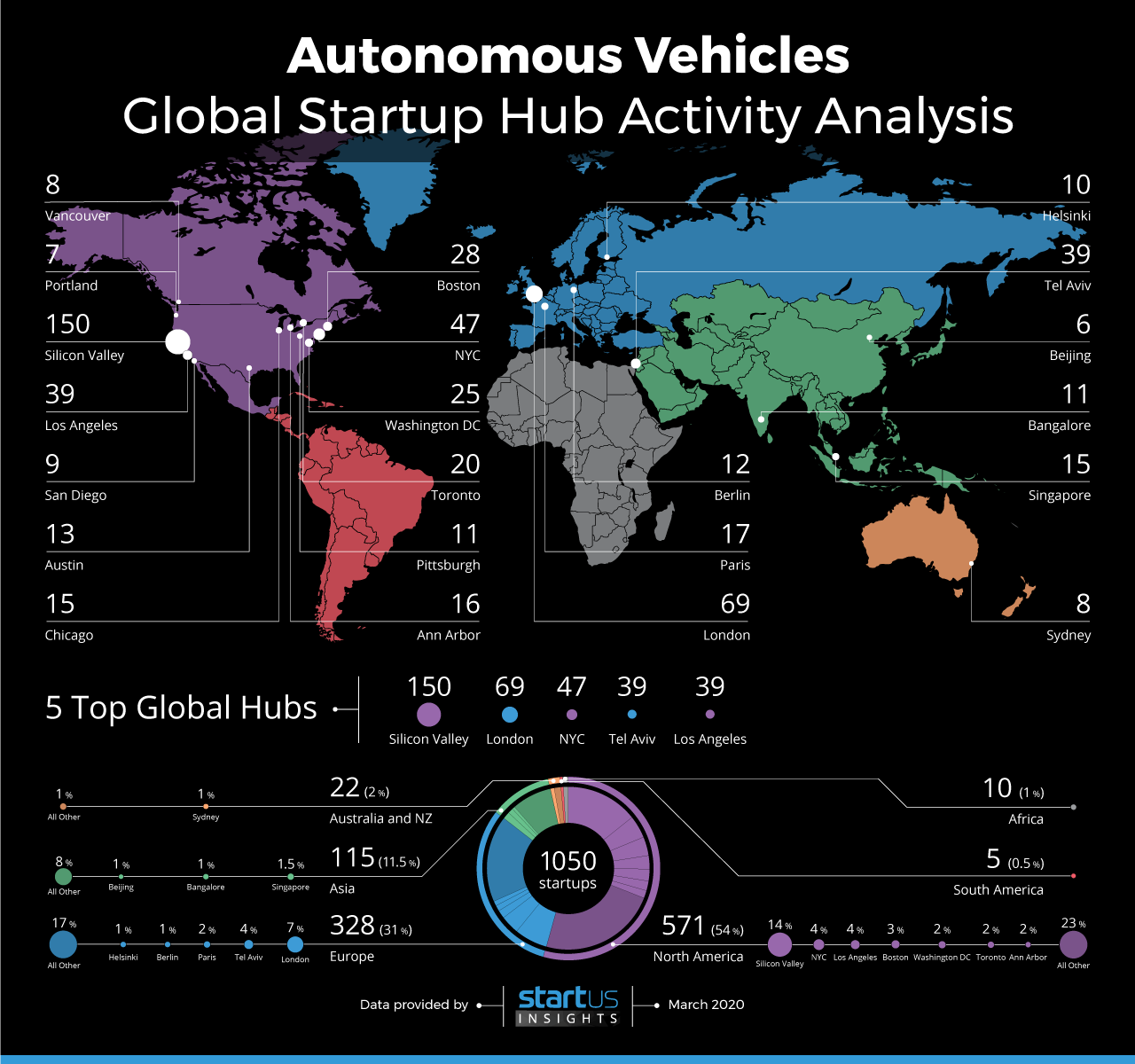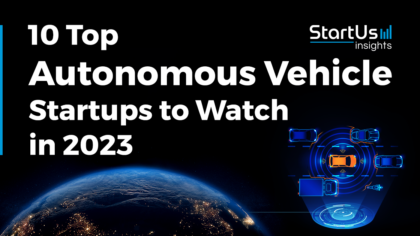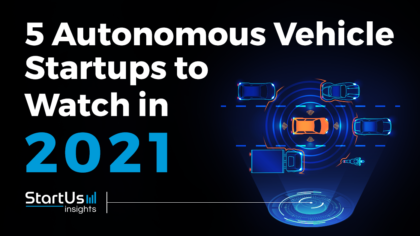In just twenty years, autonomous vehicles (AVs) have transformed from being unreliable and ‘too futuristic’ to becoming feasible and viable as a solution for mass urban mobility. An explosion of ride-hailing services combined with rapid advancements in sensing technologies plays a key role in the progress of AVs. Meanwhile, startups and emerging companies develop underlying technology-driven support solutions to truly enable self-driving vehicles.
Big automotive players already offer level 1 autonomy for most cars – features like cruise control. Of late, we have even seen a rise in cars equipped with technology that allows it to maintain lanes and monitor its surroundings – levels 2 and 3. Increasingly, ride-hailing and -sharing services experiment with level 4 autonomy where the driver is not required to pay full attention to the driving but still requires one. Some major challenges for AVs, including improving perception and safety, force policymakers to remain cautious over autonomous driving permits and legislation.
Top 5 Global Autonomous Vehicles Startup Hubs
Using our StartUs Insights Platform, we analyzed the geographic distribution of global activity in Autonomous Vehicles. We identified 22 regional hubs* that observe high activity in developing self-driving technologies and solutions across industries like automotive, mobility, manufacturing, and construction to name a few.
According to our data, Silicon Valley, London, New York City, Tel Aviv, and Los Angeles are home to 344 startups and emerging companies* accounting for 33% of global activity. Let us have a look at some of the promising Autonomous Vehicle startups from these 5 top hubs.
According to our data, more than half of all global activity regarding autonomous driving occurs in the USA. Apart from Silicon Valley, emerging companies develop AV solutions from Portland to Chicago and even in Washington DC. A third of global activity also happens in Europe, with major centers in London and Tel-Aviv.
Singapore and Sydney also observe increasing AV startup activity. Asian innovation hubs in India and South-East Asia face tougher challenges, both in terms of infrastructure readiness and government policy. With the potential for connecting remote regions across Africa, the continent is already home to a handful of solutions for autonomous vehicles. China also shows a high interest in AV development and hosts a series of testing for its developers.
#1 Silicon Valley | 150 Startups & Emerging Companies
By far the biggest hub for autonomous driving technology, Silicon Valley has seen an increasing number of big companies opening specialized centers for AV development. As a result, the industry’s biggest names collaborate with startups and emerging companies, as well as with each other, to realize truly autonomous vehicles. The US state of California has also passed AV legislation that determines the regulations for testing on roads. As AVs become safer, regulation will follow.
Operating from Mountain View in California, Phantom Auto is a startup developing teleoperation solutions for a variety of autonomous vehicles. The startup’s solution allows fleet operators to remotely operate and monitor their autonomous vehicles. From passenger and commercial cars, yard trucks, forklifts, and last-mile delivery robots, the startup enables autonomy through telemonitoring, tele-assistance, and real-time tele-driving. Phantom Auto’s software development kit (SDK) bridges the gap between testing and deployment of AVs.
#2 London | 66 Startups & Emerging Companies
Transport For London (TfL) is part of the Greater London Authority that sets the regulations for testing connected and autonomous vehicles. With several trials already conducted, Londoners are waiting to see how well AVs perform in real-life scenarios. In fact, the successful testing of AVs in London’s narrow and winding streets encourages the development of AV and its supporting technologies.
London-based startup Humanising Autonomy develops a pedestrian intent prediction platform that makes autonomous vehicles safer and more efficient in urban environments. The startup’s software integrates with driver assistance systems (ADAS), autonomous vehicle stacks, and smart infrastructure systems to provide real-time accident and near-miss prevention support. Chiefly, the company’s human-machine interaction software informs AVs about a pedestrian’s distraction level, crossing intent, and risk level, among other parameters.
#3 New York City | 47 Startups & Emerging Companies
Though arriving a little late in New York City, the first autonomous vehicles have started testing in the city. The state also has some of the strictest regulations regarding testing and operating autonomous vehicles, e.g. current rules allow autonomous fleets to operate in less populated areas of the city. While lawmakers weigh the benefits of advancing AV technology for increasing use of public transport, concerns over safety overshadow the current AV policy.
Given these tighter regulations, New York City’s emerging AV companies focus on advancing the underlying technologies that drive AVs, such as sensing and navigation. Voyant Photonics is a startup that works on technologies to replace bulky LiDAR systems by incorporating numerous hardware into a small chip. This fingerprint-sized chip significantly reduces costs and enables semiconductor scaling for 3D sensing technologies. In addition to applications for autonomous driving, the chip also caters to drones, robots, factories, and personal appliances.
#4 Tel Aviv | 39 Startups & Emerging Companies
Over the last five years, policymakers in Tel Aviv have allowed autonomous vehicles to operate on public roads. Supported by emerging companies from across Europe, Tel Aviv offers a different set of challenges for testing AVs, as well as its related technologies. From numerous roundabout junctions and presence of two-wheeler traffic on the road potentially makes AVs tested here more reliable. Also, a track record of strong research and development (R&D) makes AV technology development in Israel something to watch out for. In fact, the industry is benefiting from favorable support from the government as well.
Operating from one of the advanced global R&D hubs, Trieye is an Israeli startup developing advanced sensing technology for autonomous vehicles. Trieye use complementary metal-oxide-semiconductor (CMOS) image sensors that allow for shortwave infrared (SWIR) capabilities. This semiconductor-based design also enables the low-cost scalability of such powerful sensing technologies. Furthermore, the startup uses existing Artificial Intelligence (AI) algorithms to solve the low-visibility challenges that AVs and ADAS face.
#5 Los Angeles | 39 Startups & Emerging Companies
In Los Angeles, state authorities have taken an active interest in advancing AV technology. Policymakers are part of AV development committees and are looking for ways to increase federal funding for their AV projects. While car owners eagerly await AVs, hoping it will reduce stress caused by traffic, city planners and authorities are well aware of the potential challenges that AVs need to overcome in order to safely operate alongside regular cars and drivers. Moreover, Southern California is now rapidly becoming an important hub for tech-based transit solutions.
COAST Autonomous is a Los Angeles-based startup offering clients autonomous vehicles as well as AV technology. The startup’s AV software uses mapping and localization techniques to create 3D maps of the region. It is built with robotic software that uses AI to perform functions like acceleration and braking. In addition, COAST Autonomous provide autonomous fleet management solutions and leverage a group of proprietary technologies to offer a variety of low-speed autonomous vehicles for city centers, campuses, parks, and for moving goods.
What’s Next?
As self-driving vehicles continue to learn to share the road with their human counterparts, they will improve in terms of safety and infrastructure. It is also important for policymakers to guide the industry initially, given the need for permits and strict scrutiny. By allowing for quick wins, like enabling up to level 3 automation for long-haul goods transportation, both humans and automatic driving systems move closer to an improved, if not fully streamlined, coexistence. Meanwhile, we expect to see increasing numbers of tests for realizing level 5 autonomous vehicles.
*A hub is defined as the regional geographic center of activity for this topic. It covers the center point with a radius of 100km. We define startups & emerging companies as those founded after 2010.







